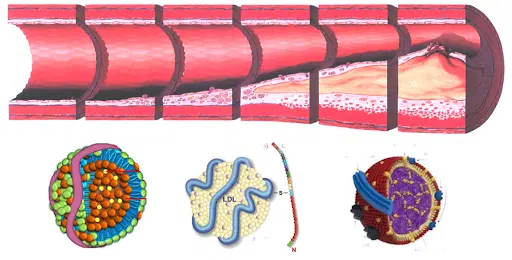Cholesterol is known to be the major risk factor for the development of obstructing plaques in the arteries (call atherosclerosis) supplying the heart muscle with nourishing blood containing oxygen among other nutrients. Such obstructing lesions can cause chest pain or angina upon exercise or even an acute myocardial infarction and premature death.
Lowering cholesterol with tablets such as statins (e.g. Atorvastatin or Rosuvastatin), Ezetimibe or PCSK9 inhibitors (that have to be injected twice monthly) all lower cholesterol and the risk of developing angina, infarction or premature death.

Figure: Blood vessel supplying the heart muscle with cholesterol-rich plaque (yellow content) and lipids causing atherosclerosis (below)
How low should we go? Individuals who have genetically very low cholesterol throughout life almost never get an infarction. Indeed, most animals in nature have extremely low cholesterol levels and do not suffer from atherosclerosis. Thus, should we go as low as possible? Most individuals in the UK and Europe have LDL-Cholesterol values, the type of lipid that is most closely related to atherosclerosis, of around 3.0-3.5mmol/l.
The new European Guidelines recommend 3.0mmol/l, if you are low risk (no hypertension, no diabetes, active and a non-smoker), 2.6mmol/l for those at moderate risk and 1.8. or even 1.4mmol/l, if you had an infarction, a stent or bypass surgery. But, overall one can say: The lower, the better! Unfortunately, dietary measures are not very effective as around 80-85% of the cholesterol is produced in the liver and only 15-20% comes from what we eat. Thus: Get your lipids checked, let your risk be assessed by an expert and discuss measures with a good physician – get checked at London Medical!
Search treatments & services A-Z
Search for a specific treatment or service.



